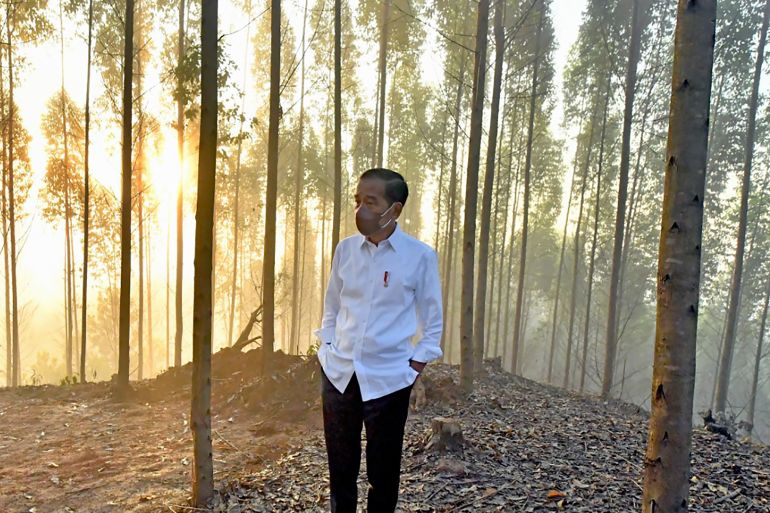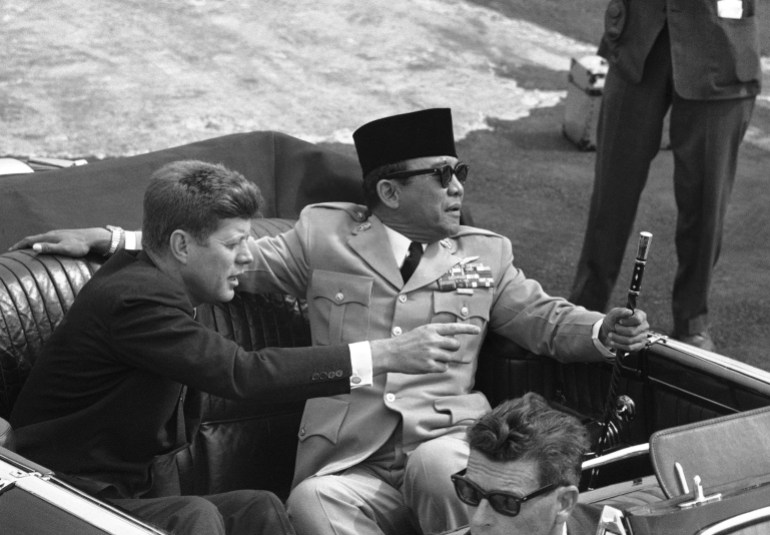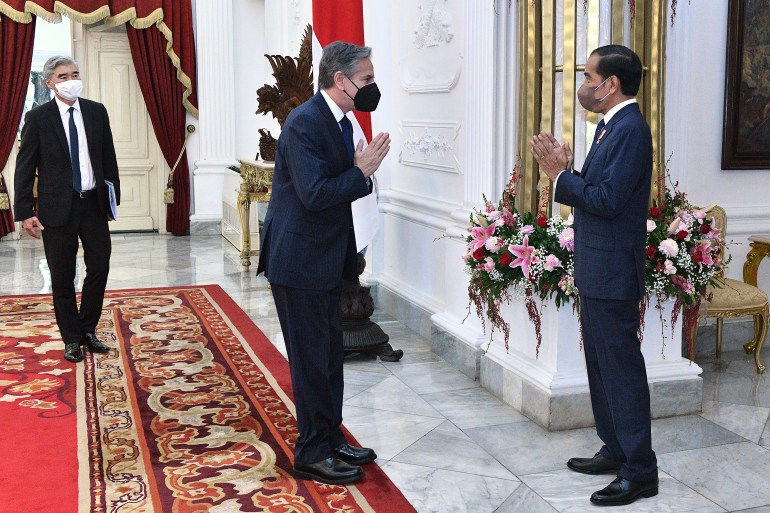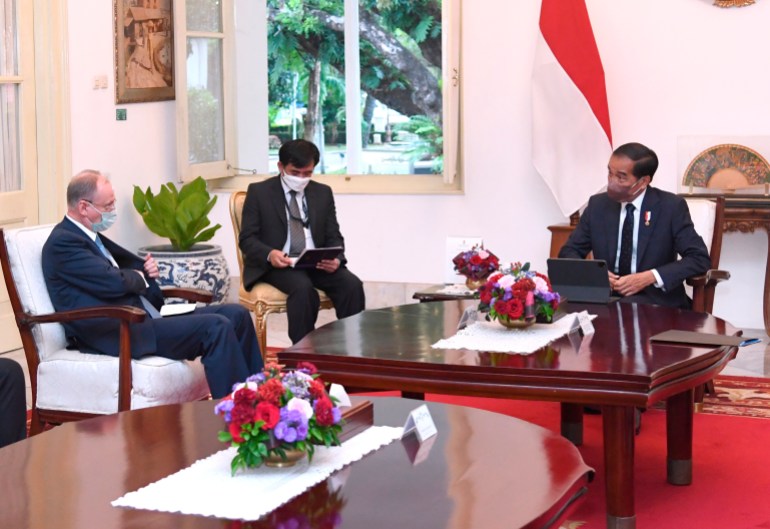‘Not G19’: Why Indonesia won’t bar Russia from the G20
After a walkout by some Western countries over the Russia’s invasion of Ukraine, Indonesia is working out its strategy for November’s summit.

Medan, Indonesia – Indonesia is “in consultation” with other members of the G20 amid growing calls for Russia to be barred from the economic forum’s November summit in Bali.
Some members of the intergovernmental group of 19 countries and the European Union have been threatening to boycott the event if Russian President Vladimir Putin and delegates from Moscow are allowed to attend, leaving Indonesian President Joko Widodo, who is better known as Jokowi and holds the annual presidency this year, in a potentially fraught position.
Keep reading
list of 4 itemsUkraine says it shot down Russian strategic bomber after strike kills nine
Russia doesn’t have capability to knock Ukraine out of war: Ex-US commander
Russia-Ukraine war: List of key events, day 785
“Sadly, this is President Jokowi’s fate,” Kosman Samosir, a lecturer in international law and vice dean of the law faculty at Santo Thomas Catholic University in Medan, Indonesia, told Al Jazeera. “Of course this had to happen now, when Indonesia has the presidency, and has to face the prospect of expelling Russia or risk members boycotting and the whole forum failing.”
According to Angelo Abil Wijaya, the head of project management and research at Y20 Indonesia, the official youth engagement group to the G20 Leaders Summit, the stakes could not be higher.
“Indonesia has invested a lot in its presidency at the G20, and has prepared for this presidency for years,” he told Al Jazeera.
“Indonesia wants its presidency to be successful. In order to be successful, the G20 should be attended by 20 of its members. Of course we want to see the success of the G20 Indonesia, not G19, or other combinations of Gs that include less than 20 members.”
The G20 not only includes the developed economies such as the United States, the United Kingdom and Japan, which have moved to impose tough sanctions on Russia over its invasion of Ukraine, but also countries such as China that have taken a more ambivalent approach.
“It appears an unavoidable reality that the presence of Putin at the G20 will result in numerous countries boycotting the event. It’s hard to imagine any degree of diplomacy changing this, short of a radical change in the situation in Russia and Ukraine itself,” Ian Wilson, a lecturer in politics and security studies at Murdoch University in Perth, told Al Jazeera.
This week’s G20 finance ministers’ meeting gave some indication of what might lie ahead when representatives from the US, UK and Canada walked out of the closed-door session in Washington as the Russian delegates began to speak.
Indonesian Finance Minister Sri Mulyani Indrawati, who was the meeting’s chair, said the walkout was “not a total surprise” and that it had not prevented discussion from continuing.
China, which has not condemned the Russian invasion despite friendly relations with Ukraine and as the world’s number 2 economy is a leading member of the G20, did not join the boycott. On Thursday, President Xi Jinping, who has developed close ties with Putin, again condemned developed nations’ sanctions on Russia.
“The focus of the G20, and why it was created, was to discuss economics and business. If you want to discuss issues of war and national security, then you need to go to the United Nations,” said law lecturer Samosir.
‘Independent’ spirit
Indonesia was a founding member along with countries including India and Egypt of the 1961 Non-Aligned Movement (NAM) – a forum of 120 nations that were not formally aligned with or against any main power bloc during the Cold War.
The spirit of NAM continues to inform Indonesian foreign policy, which maintains what it calls a “bebas-aktif” approach to international affairs – an “independent” stance and an “active” role in global governance.
Jakarta has so far maintained that it still plans to invite the leaders of all 20 members to the summit.
On Thursday, former Foreign Minister Marty Natalegawa told Australia’s The Age newspaper that Indonesia should invite Ukraine to the summit not only to appease the concerns of those who have threatened to boycott the event, but also to make the most of a “precious opportunity” to bring an end to the conflict and address its economic consequences.
The Indonesian government has said that it will continue to consult with G20 members and other stakeholders on the issue.

Minister for Foreign Affairs Retno Marsudi is currently drafting a report for President Widodo with recommendations on how to proceed.
Indonesia was initially slow to address the conflict in Ukraine publicly but was among 141 countries that last month backed a UN resolution condemning the invasion.
But Indonesia’s reticence around Russia is also part of a more complex political picture that reflects Jakarta’s own relationship with Moscow, as well as the role it sees for itself within the region.
“Indonesia decided to purchase advanced fighter jets from Russia, notably the Sukhoi SU-27 and SU-30 and was in negotiations to purchase SU-35 fighter jets before the plan was abandoned due to fears of US sanctions,” Yohanes Sulaiman, a lecturer in International Relations at Universitas Jenderal Achmad Yani in Bandung, told Al Jazeera.
“Indonesia needs Russia as an alternative weapon supplier, so it won’t be completely reliant on the US.”
Indonesia is the largest economy in Southeast Asia, and Sulaiman added that, in terms of the geopolitical landscape, the country was also concerned about a growing Chinese or US presence in an area it sees as its own back yard.
“Due to its sheer size, Indonesia sees itself as a natural leader in Southeast Asia. Indonesia distrusts both China and the United States as there is a long history of the two countries interfering in Indonesian internal affairs,” he said.
“Indonesia doesn’t want a completely isolated Russia that would be too close to China.”
Learning from the past
This is not the first time tensions have flared between Russia and other G20 members.
In 2014, when Australia held the G20 presidency, Putin left the November summit in Brisbane two days early after being reprimanded by members of the forum for his support of separatists in eastern Ukraine.
He was also taken to task over the deaths of 298 people on board Malaysia Airlines flight MH17 which had been shot down by a Russian-made missile in the skies above an area of eastern Ukraine controlled by pro-Russia separatists in July 2014. Moscow has denied any involvement in shooting down the plane.
At the time of his walkout, Putin said that he needed to catch up on sleep and accused Western countries of “switching off their brains” by imposing economic sanctions on Russia.


This February’s invasion has triggered even tougher sanctions.
“The current conflict between Russia and Ukraine has had more impact and there is a greater possibility of a prolonged crisis as well,” Dandy Rafitrandi, a researcher at the department of economics at the think tank the Center for Strategic and International Studies told Al Jazeera.
He added that Indonesia should learn from the 2014 fiasco, but also focus on the importance of the forum for all stakeholders as a way to avoid a boycott.
“The narrative could perhaps be that the interests of middle and lower income countries, which are still in the process of economic recovery, could become very costly if G20 agendas are hampered, such as Special Drawing Rights, the Debt Service Suspension Initiative, and plans to establish a Global Health Fund. These issues certainly need a lot of input from developed countries as owners of resources,” he said.
In addition to the boycott pressure, the region also has its share of domestic struggles, including the ongoing conflict in Myanmar. Diplomatic efforts by the 10-member Association of Southeast Asian Nations (ASEAN), which also includes Indonesia, have so far failed to make headway with the military government.
The failure may leave some wondering whether a similar softball approach to Russia is the best strategy.
“Indonesia’s position is, in part, made difficult by its desire to maintain diplomatic relations with a country currently engaged in a brutal war of invasion of a sovereign state, a war almost universally condemned,” Wilson said.
“The challenge and risk with an inclusive approach to diplomacy is that it can serve to legitimise the worst of behaviour while undermining international efforts, such as in ASEAN’s inability to effectively censure Myanmar’s post-coup regime.”